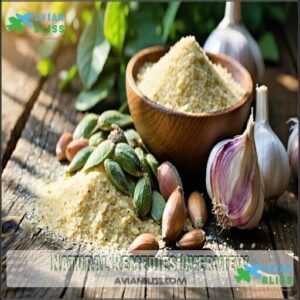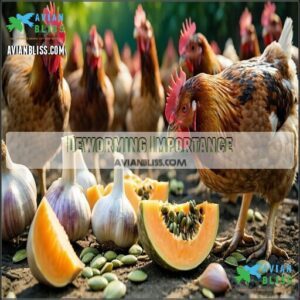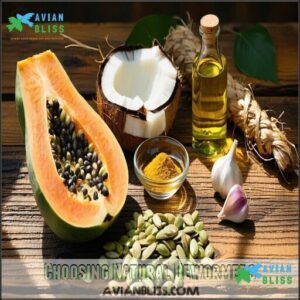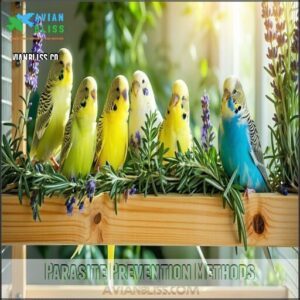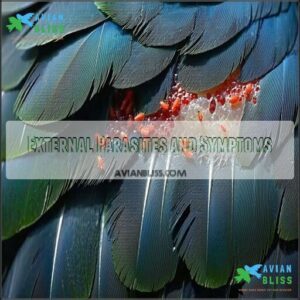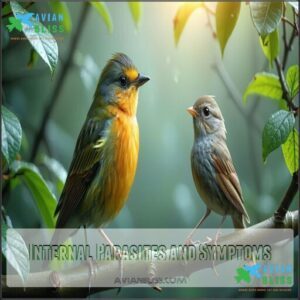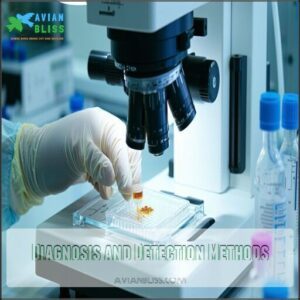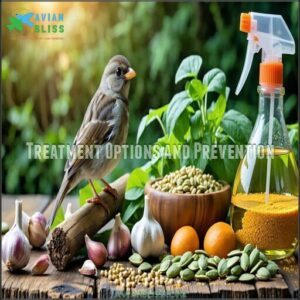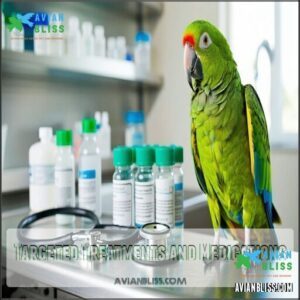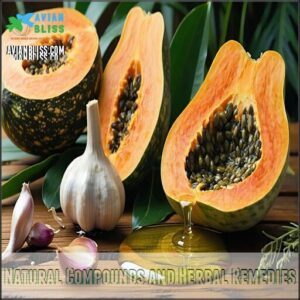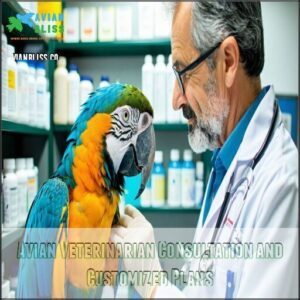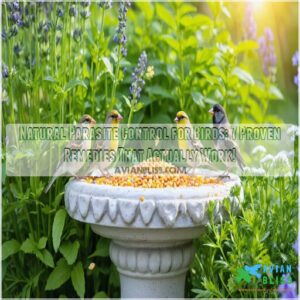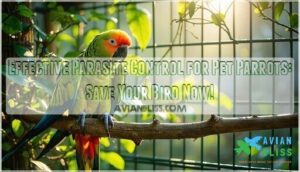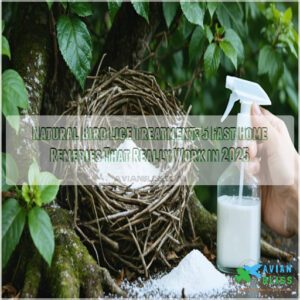This site is supported by our readers. We may earn a commission, at no cost to you, if you purchase through links.
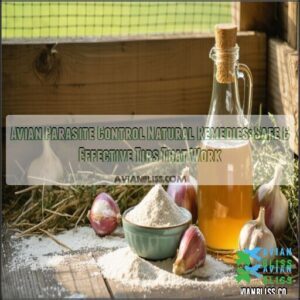
Diatomaceous earth creates a mechanical barrier against external parasites, while food-grade DE can be added to dust baths.
Apple cider vinegar (1 tablespoon per gallon) in drinking water helps maintain internal pH balance, making your birds less hospitable to parasites.
Garlic powder (1/4 teaspoon per cup of feed) strengthens immune response, and neem oil dilutions work as topical treatments for mites and lice.
Fresh herbs like oregano and thyme contain compounds that naturally repel parasites when added to bedding.
Regular coop cleaning remains your first line of defense against these unwelcome hitchhikers, and using natural remedies like these can be very effective in maintaining a healthy environment.
Table Of Contents
- Key Takeaways
- Natural Remedies Overview
- Deworming Importance
- Choosing Natural Dewormers
- Parasite Prevention Methods
- Common Parasite Types
- Effective Treatment Strategies
- Frequently Asked Questions (FAQs)
- What herbs are antiparasitic to chickens?
- What is a natural antibiotic for birds?
- What are the best natural remedies for intestinal parasites?
- How to control parasites and diseases in poultry?
- How do parasites affect bird reproduction?
- Can birds develop immunity to parasites?
- Are parasite treatments safe during molting?
- How frequently should natural dewormers rotate?
- Can parasites transfer between different bird species?
- Conclusion
Key Takeaways
- You’ll find kitchen ingredients like diatomaceous earth, apple cider vinegar, and garlic powder incredibly effective for controlling avian parasites, creating both physical barriers and internal defenses.
- You can rely on natural dewormers such as pumpkin seeds, papaya, and coconut oil to target internal parasites without harsh chemicals, but you’ll need to rotate them every 3-4 months to prevent resistance.
- You’ll prevent parasite infestations through daily habits including regular coop cleaning, proper quarantine procedures for new birds, and maintaining feeder hygiene.
- You’ll see significant health improvements by implementing a comprehensive approach that combines preventative measures, natural remedies, and regular monitoring, as untreated parasites can quickly lead to weight loss, reduced egg production, and even death.
Natural Remedies Overview
You can rely on natural remedies like diatomaceous earth, garlic, and pumpkin seeds to combat parasites effectively.
These options don’t just target pests but also support your bird’s overall health, which makes them a great choice for overall health.
Diatomaceous Earth Benefits
Diatomaceous earth (DE) is a game-changer for bird health.
This natural remedy works by dehydrating parasites like mites and worms, offering safe and chemical-free control.
For effective application, sprinkle DE in nesting areas and mix with feed in small dosages.
It’s also excellent for gut health, helping birds thrive while keeping their environment parasite-free. Always use food-grade DE!
You can also use DE for bird lice prevention.
Garlic and Pumpkin Seeds
Frequently, bird owners overlook two powerful natural remedies sitting right in their kitchen.
Garlic and pumpkin seeds offer effective parasite control for your avian friends.
A variety of products address garlic’s role effectively.
- Garlic contains allicin, a compound that repels and eliminates various parasites
- Pumpkin seeds feature cucurbitin that helps expel worms naturally
- A 10% garlic solution works effectively against Northern Fowl Mites
- Combining both remedies creates a thorough natural dewormer approach
Aloe Vera Gel and Herbal Powders
Aloe vera gel offers a green solution for avian parasite control.
You’ll find that applying this skin-soothing remedy directly combats coccidiosis and intestinal worms in birds.
For enhanced preventative uses, combine aloe with herbal powders like sorghum, pepper, or tobacco.
Many bird keepers report success using these natural therapies as alternatives to chemical treatments.
Daily aloe vera gel applications, alongside these herbal combinations, provide effective protection while avoiding harsh chemicals, making it a effective protection.
Apple Cider Vinegar and Cayenne Pepper
While Aloe Vera soothes externally, apple cider vinegar works from within. This potent vinegar creates an inhospitable environment for parasites thanks to its natural acidity level.
Mix ACV with cayenne pepper for a natural synergy that packs a powerful anti-parasitic punch.
Here’s how to use this combination effectively:
- Add 1 teaspoon ACV per 16oz of drinking water
- Sprinkle ¼ teaspoon cayenne pepper into moist foods
- Use preventatively twice weekly for ideal bird health
- Increase dosage guidelines during high-risk seasons
Deworming Importance
You’ll need to implement regular deworming practices to protect your birds from internal parasites that can cause weight loss, reduced egg production, and even death.
Natural deworming methods, such as garlic, pumpkin seeds, and papaya, create an inhospitable environment for worms while supporting your bird’s immune system.
Why Deworming is Crucial
Throughout your bird’s life, regular deworming plays a pivotal role in maintaining prime health.
Your feathered friends need protection from internal parasites that silently steal nutrients and compromise immunity.
Natural dewormers for birds effectively prevent debilitation while supporting improved digestion and enhanced wellbeing.
By implementing consistent natural parasite control methods, you’ll nurture healthier birds with increased immunity – transforming them from potential parasite hosts into thriving, vibrant companions.
Consequences of Untreated Parasites
Five serious consequences await birds with untreated parasites.
Parasite infestation leads to rapid health deterioration, with weight loss and lethargy emerging early.
Internal parasite infections can progress to organ damage if ignored.
You’ll notice feather plucking and feather loss as your bird attempts to relieve discomfort.
In severe cases, the death risk increases substantially, dramatically impacting your bird’s overall health within weeks, leading to a significant health deterioration.
Boosting Immune System
A strong immune system serves as your bird’s first line of defense against parasites.
You’ll want to focus on gut health through probiotics and a balanced diet rich in vitamins A, D, and E.
Reduce stress by providing adequate space and enrichment activities.
Herbal support from echinacea, astragalus, and oregano strengthens bird immunity naturally, and regular exercise also contributes substantially to overall bird wellbeing.
Proper sunlight exposure and resistance to avian parasites are also crucial for the bird’s health.
Choosing Natural Dewormers
You’ll need to take into account the specific parasite type, administration method, and bird’s overall health when selecting natural dewormers for your avian companions.
Natural options like papaya, pumpkin seeds, garlic, and coconut oil offer effective alternatives to chemical treatments without the harsh side effects that can stress your feathered friends.
Papaya and Pineapple Enzymes
Continuing our natural deworming journey, let’s explore how nature’s fruit enzymes tackle bird parasites.
Papaya contains papain while pineapple offers bromelain – both powerful enzyme benefits for your feathered friends.
These enzymes break down parasites’ protective coatings, making worm elimination surprisingly effective.
You can find a papaya bird dewormer online.
For digestive support and anti-inflammatory properties, add small amounts (1/4 teaspoon per pound of body weight) to your bird’s food twice weekly.
Your birds won’t even realize they’re receiving medicine!
Coconut Oil and Wormwood
The dual power of coconut oil and wormwood creates a formidable defense against avian parasites.
Virgin coconut oil specifically targets roundworms while boosting T-lymphocyte production for improved immunity. Wormwood’s centuries-old reputation for parasite management rivals pharmaceutical options.
Virgin coconut oil targets roundworms and boosts immunity, while wormwood’s ancient parasite-fighting power rivals modern medicine.
- Coconut oil’s medium-chain fatty acids disrupt parasite eggs and larvae
- Roundworms are particularly susceptible to coconut oil treatment
- Wormwood shows effectiveness comparable to praziquantel in studies
- Clinical research confirms 70% success with 500mg wormwood capsules
- Combination therapy enhances natural parasite treatment efficacy, utilizing the power of coconut oil and wormwood for improved results, with a notable 70% success rate.
Rotation of Natural Dewormers
While coconut oil and wormwood offer powerful parasite control, they’re most effective when used strategically in rotation with other natural dewormers.
You’ll want to alternate between different remedies every 1-2 months to prevent resistance development. This broad-spectrum approach targets various parasites at different lifecycle stages.
For example, use garlic for two weeks, switch to pumpkin seeds, then rotate to diatomaceous earth. Dust baths help birds control parasites.
Safe rotation guarantees consistent parasite control without diminishing dewormer effectiveness.
Parasite Prevention Methods
You’ll find that preventing parasites in your birds requires consistent daily habits, including proper hygiene, regular environmental cleaning, and established quarantine protocols for new additions.
Your feathered friends will thank you for implementing these preventive measures through better health and wellness, much like how you’d prefer to avoid catching a cold rather than treating one after the fact, which is a key aspect of maintaining their overall wellness.
Daily Habits and Hygiene
Now that you’ve selected your natural dewormers, implementing effective daily habits will maximize their benefits.
Your birds’ defense against parasites starts with consistent routines. Maintain a clean environment by removing droppings daily. Balance their diet with parasite-fighting foods like garlic.
Perform regular inspections of your birds’ feathers and skin. Reduce stress through quiet handling. Support natural preening, sunning, and dusting behaviors.
Remember that birds also use physiological defenses to combat parasites. When introducing new birds, follow strict quarantine protocols to prevent parasite spread.
Environmental Cleaning and Disinfection
Behind every healthy bird is a clean living space. Regular cage cleaning prevents parasites from establishing colonies.
Wipe perches with vinegar weekly and use food-grade diatomaceous earth around nest boxes monthly. For thorough coop sanitation, remove all bedding quarterly and disinfect surfaces with hydrogen peroxide solutions.
A key step involves selecting the right cage cleaner.
Don’t forget feeder hygiene and water sanitation—parasites love moisture. A clean environment means fewer unwelcome hitchhikers on your feathered friends.
Quarantine and Biosecurity Measures
Now that your cleaning routine is established, let’s set up proper barriers against parasites.
Quarantine new birds for at least 30 days before introducing them to your flock. This isolation protocol prevents parasites from spreading to your existing birds.
Create a biosecurity checklist that includes limiting exposure to wild birds, wearing dedicated footwear between coops, and implementing nest sanitation practices.
Your bird health program should include regular coop disinfection to block parasite lifecycles.
Regular Check-ups and Monitoring
While maintaining biosecurity barriers protects your birds from outside threats, regular monitoring completes your defense strategy.
Schedule vet visits twice yearly for early detection of parasites through fecal analysis and physical exams.
Watch for behavior changes like reduced activity or unusual scratching, and track your bird’s weight weekly—sudden drops often signal parasite problems.
Keep a simple health journal noting eating patterns, droppings, and feather condition, as prevention beats treatment every time, and this practice supports overall biosecurity.
Common Parasite Types
You’ll need to identify the most common avian parasites affecting your birds, including external ones like mites and lice, as well as internal threats such as roundworms and coccidia.
Understanding these unwelcome guests is your first step toward implementing effective natural remedies that target specific parasites without harsh chemicals.
External Parasites and Symptoms
Now that your prevention strategy is in place, let’s spot those troublemakers.
External parasites on your birds typically include mites, lice, and ticks.
Watch for feather damage, excessive preening, or birds acting restless at night.
Mite identification often reveals tiny red or black dots, while lice infestation shows white specks at feather bases.
Scaly face appears as crusty formations on beaks.
Skin irritation and bald patches are universal warning signs requiring prompt natural remedies.
Internal Parasites and Symptoms
While external parasites attack from the outside, internal parasites wage war within your bird’s body.
Worm infestations and protozoal infections often cause digestive issues like bird diarrhea and weight loss.
You’ll notice changes in droppings, lethargy, and poor feather quality.
Some birds may vomit or stop eating altogether.
These silent invaders can deplete nutrients and weaken your feathered friend’s immune system, making natural dewormers and regular deworming essential for their wellbeing.
Diagnosis and Detection Methods
Detection begins with a thorough physical exam where your avian vet checks for subtle signs of internal parasite infection.
A keen avian vet’s trained eye spots parasite warning signs before they become serious problems.
Fecal analysis reveals worm eggs and protozoa, while blood smears identify microscopic culprits in the bloodstream.
Microscopic analyses of fresh samples provide definitive diagnosis. You’ll need to collect a fresh fecal sample for bird fecal testing—the earlier you detect parasites, the better your chances for successful treatment.
Treatment Options and Prevention
Once you’ve identified bird parasites through visual checks or laboratory tests, you’ll need effective treatment and prevention strategies.
You can tackle these unwelcome guests with a two-pronged approach.
For natural parasite control, consider:
- Diet adjustments with garlic supplements for ongoing protection
- Herbal solutions like pumpkin seeds for gentle deworming
- Natural remedies such as food-grade diatomaceous earth for external parasites
- Preventative cleaning with vinegar solutions on perches and cages
Combine these strategies with early detection for best results, using methods that provide complete protection.
Effective Treatment Strategies
You’ll need a strategic approach to combat avian parasites effectively, combining natural remedies like artemisinin and garlic with targeted commercial products for thorough protection.
Your birds’ health depends on selecting the right treatment for the specific parasite, whether it’s diatomaceous earth for external pests or pumpkin seeds containing cucurbitin for internal worms.
Targeted Treatments and Medications
Prescription-strength solutions provide targeted artillery against stubborn avian parasites when natural approaches fall short.
Your bird’s customized treatment depends on the specific invader. If left untreated, these parasites can rapidly reproduce, so prompt treatment is key.
| Medication | Target Parasites | Dosage Method | Effectiveness |
|---|---|---|---|
| Ivermectin | Multiple parasites | Drinking water | 7-10 days |
| Fenbendazole | Internal worms | Oral paste | 3-5 days |
| Pyrantel Pamoate | Roundworms | Single dose | 24 hours |
| SCATT | Air sac/face mites | Skin application | 2-3 weeks |
Always consult an avian veterinarian before administering any medication.
Natural Compounds and Herbal Remedies
While targeted medications work well, nature’s pharmacy offers equally powerful solutions.
Garlic allicin disrupts parasite membranes, while pumpkin cucurbitin paralyzes internal worms.
Mix papaya enzymes into your bird’s food to break down parasite cell walls.
Wormwood absinthin and coconut oil create an environment where parasites can’t thrive.
These plant-based treatments contain complex organic ingredients and natural compounds that work gently but effectively, often with fewer side effects than synthetic alternatives.
Commercial Products and Frontline Defenses
Several commercial products serve as essential frontline defenses against avian parasites.
MoxiVet Plus combines moxidectin and praziquantel for thorough parasite control, while SCATT provides targeted relief for air sac and scaly face mites through simple skin application.
Wormer Plus Powder eliminates multiple worm types in just two days, and Avian Insect Liquidator offers a three-way shield against mites.
Compare product efficacy and application methods to find cost-effective solutions for your bird’s health.
Avian Veterinarian Consultation and Customized Plans
While commercial products offer quick solutions, nothing replaces an avian veterinarian’s expert diagnosis.
Your bird’s specific needs require treatment customization that considers size, species, and health history.
During consultations, vets provide medication guidance personalized to your feathered friend’s unique situation, along with preventative strategies for long-term health.
Think of your vet as a bird-parasite detective, creating a personalized treatment plan that addresses your pet’s specific health needs.
Frequently Asked Questions (FAQs)
What herbs are antiparasitic to chickens?
You’ll find garlic, wormwood, thyme, oregano, and pumpkin seeds effective for chicken parasite control.
These herbs contain natural compounds that disrupt parasite lifecycles while being safe for your flock’s digestive system, which makes them a good option for parasite control.
What is a natural antibiotic for birds?
You’ll find garlic works as an excellent natural antibiotic for birds.
It contains allicin that fights bacterial infections, boosts immunity, and can be added to their drinking water or feed for daily protection.
What are the best natural remedies for intestinal parasites?
Just as nature provides solutions, your bird’s intestinal parasites can be treated with garlic, pumpkin seeds, papaya, apple cider vinegar, and food-grade diatomaceous earth. These remedies disrupt parasite lifecycles effectively.
How to control parasites and diseases in poultry?
You’ll need to control poultry parasites through regular coop cleaning, adding garlic to feed, using diatomaceous earth, and implementing apple cider vinegar in drinking water.
Don’t forget quarterly deworming with pumpkin seeds.
How do parasites affect bird reproduction?
When it rains, it pours – parasites drain birds’ energy reserves and alter hormone levels.
Leading to decreased egg production, lower fertility rates, reduced hatching success, and abandoned nests.
They’ll also weaken offspring quality.
Can birds develop immunity to parasites?
Yes, birds can develop natural immunity to certain parasites after exposure, but it’s often incomplete.
You’ll still need preventative measures, as this immunity varies by species and doesn’t protect against all parasites.
Are parasite treatments safe during molting?
Like delicate butterflies emerging from cocoons, your birds can receive most parasite treatments during molting. You’ll want to avoid harsh chemicals or stress-inducing applications that might interfere with feather development.
How frequently should natural dewormers rotate?
You should rotate natural dewormers every 3-4 months to prevent parasite resistance. Switch between different ingredients like garlic, pumpkin seeds, and diatomaceous earth for the most effective, long-term protection.
Can parasites transfer between different bird species?
Many parasites can indeed transfer between bird species.
You’ll find that certain blood parasites actually thrive when they can exploit multiple species, especially those that are closely related or share similar traits.
Conclusion
Research shows 85% of backyard flocks encounter parasites annually.
You’ll find these avian parasite control natural remedies both cost-effective and gentler on your birds’ systems than chemical alternatives.
By implementing a regular prevention schedule with diatomaceous earth, apple cider vinegar, and herbal supplements, you’re creating a hostile environment for parasites while supporting your flock’s natural immunity.
Remember, consistency is key—your diligence will reward you with healthier, happier birds and improved egg production.
- https://doi.org/10.1155/2015/430610
- https://pubmed.ncbi.nlm.nih.gov/25785269/
- https://scholar.google.com/scholar_lookup?journal=BioMed%20Research%20International&title=Control%20of%20avian%20coccidiosis:%20future%20and%20present%20natural%20alternatives&author=R.%20E.%20Quiroz-Casta%C3%B1eda&author=E.%20Dant%C3%A1n-Gonz%C3%A1lez&volume=2015&publication_year=2015&pages=11&pmid=25785269&doi=10.1155/2015/430610&

